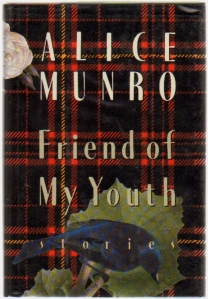Reading Differently
 I was, like many readers, delighted and pleasantly surprised when Alice Munro was named the winner of this year's Nobel Prize in Literature. For one thing, I had actually read her. For another, she is one of the great examples of a woman writing about what are commonly considered women's concerns -- relationships, the domestic sphere and the everyday lives of women -- and proving beyond doubt that these are indeed literary matters, even from the woman's point of view. One of her story collections is even titled Hateship, Friendship, Loveship, Courtship, Marriage -- you have to wonder if that's almost a sly dare on her part to go ahead and try to restrict her to some literary ghetto.
There's also the fact that she writes short stories, a form that no longer has the attention it once did from the reading public, and that she is a realist. Maybe that's what got my attention when, one day in the late 1980s as a college student who had never heard of Alice Munro, I picked up a copy of The New Yorker and read a story called "Differently." It changed my world, at least as a reader. I immediately got my hands on all of Munro's previous works and became a devoted fan. Images from that story have stayed with me and Munro's world in general felt both familiar and expansive -- the world of intelligent women navigating stifling economic and family backgrounds, reaching for something, doing things they are ashamed of or defiantly going out on their own. I didn't always like her characters but I always found them interesting. More than interesting -- compelling.
I was, like many readers, delighted and pleasantly surprised when Alice Munro was named the winner of this year's Nobel Prize in Literature. For one thing, I had actually read her. For another, she is one of the great examples of a woman writing about what are commonly considered women's concerns -- relationships, the domestic sphere and the everyday lives of women -- and proving beyond doubt that these are indeed literary matters, even from the woman's point of view. One of her story collections is even titled Hateship, Friendship, Loveship, Courtship, Marriage -- you have to wonder if that's almost a sly dare on her part to go ahead and try to restrict her to some literary ghetto.
There's also the fact that she writes short stories, a form that no longer has the attention it once did from the reading public, and that she is a realist. Maybe that's what got my attention when, one day in the late 1980s as a college student who had never heard of Alice Munro, I picked up a copy of The New Yorker and read a story called "Differently." It changed my world, at least as a reader. I immediately got my hands on all of Munro's previous works and became a devoted fan. Images from that story have stayed with me and Munro's world in general felt both familiar and expansive -- the world of intelligent women navigating stifling economic and family backgrounds, reaching for something, doing things they are ashamed of or defiantly going out on their own. I didn't always like her characters but I always found them interesting. More than interesting -- compelling.
Munro spoke to me in a way that the writers who were cool at the time just didn't. I never got into that minimalist school, like Robert Coover. I wasn't blown away by Pynchon or Delillo. I read the White Male Narcissists, as David Foster Wallace famously called them (Updike, Cheever, Mailer) but they didn't do it for me the way Munro did. Of the young writers of that era who were allegedly going to be the voices of my generation -- Bret Easton Ellis, Jay McInerney, Tama Janowitz -- only Michael Chabon won my devotion and I've been glad to see he's the one with staying power -- and that he has managed to avoid the Franzenian gender wars, or whatever they are.
So thank you, Alice Munro, for writing "Differently" all those years ago (you can read it in her collection "Friend of My Youth" or in the "Selected Stories"). And thank you, Swedish prize committee people for recognizing her. She already has a broad and devoted readership, but this can't help but lead more readers her way, maybe some of them young women who are wondering why the literature she is supposed to admire just doesn't work for her.